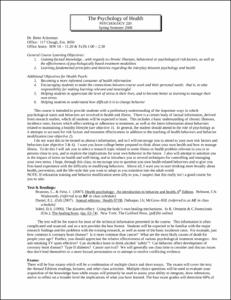Please use this identifier to cite or link to this item:
http://hdl.handle.net/10267/3616Full metadata record
| DC Field | Value | Language |
|---|---|---|
| dc.contributor.author | Ackerman, Bette | - |
| dc.date.accessioned | 2009-03-24T16:30:08Z | - |
| dc.date.available | 2009-03-24T16:30:08Z | - |
| dc.date.issued | 2008-01-09 | - |
| dc.identifier.uri | http://hdl.handle.net/10267/3616 | - |
| dc.description | This syllabus was submitted to the Office of Academic Affairs by the course instructor. | en_US |
| dc.description.abstract | This course is intended to provide students with a preliminary understanding of the important ways in which psychological states and behaviors are involved in health and illness. There is a certain body of factual information, derived from research studies, which all students will be expected to learn. This includes a basic understanding of chronic illnesses, incidence rates, factors which affect seeking or adherence to treatment, as well as the latest information about behaviors related to maintaining a healthy lifestyle (see objective 1). In general, the student should attend to the role of psychology as it attempts to account for risk factors and treatment effectiveness in addition to the teaching of health behaviors and behavior modification (see objective 2). I do not want this to be treated as abstract information, and so I will encourage you to attend to your own risk factors and behaviors (see objective 3 & 4). I want you leave college better prepared to think about your own health and how to manage illness. To do this I will ask you to select a research topic related to some illness or health problem relevant to you or to persons close to you, and to explore the implications for your own behavior in the future. I also will attempt to sensitize you to the impact of stress on health and well-being, and to introduce you to several techniques for controlling and managing your own stress. I hope, through this class, to encourage you to question you own health-related behaviors and to give you first-hand experience with the difficulty in modifying behaviors. Above all, I want you to start thinking more broadly about health, prevention, and the life-style that you want to adopt as you transition into the adult world. NOTE: If relaxation training and behavior modification seem silly to you, I suspect that this really isn’t a good course for you to take. | en_US |
| dc.language.iso | en_US | en_US |
| dc.publisher | Memphis, Tenn. : Rhodes College | en_US |
| dc.relation.ispartofseries | Syllabi CRN | en_US |
| dc.relation.ispartofseries | 28497 | en_US |
| dc.rights | Rhodes College owns the rights to the archival digital images in this repository. Images are made available for educational use only and may not be used for any non-educational or commercial purpose. Approved educational uses include private research and scholarship, teaching, and student projects. For additional information please contact archives@rhodes.edu. Fees may apply. | - |
| dc.subject | Psychology, Department of | en_US |
| dc.subject | Syllabus | en_US |
| dc.subject | Text | en_US |
| dc.subject | Curriculum | en_US |
| dc.subject | 2008 Spring | en_US |
| dc.title | PSYC 220-01, The Psychology of Health, Spring 2008 | en_US |
| dc.type | Syllabus | en_US |
| Appears in Collections: | Course Syllabi | |
Files in This Item:
| File | Description | Size | Format | |
|---|---|---|---|---|
| 2008_sp_PSYC_220-01_28497.pdf | 107.36 kB | Adobe PDF |  View/Open |
Items in DSpace are protected by copyright, with all rights reserved, unless otherwise indicated.